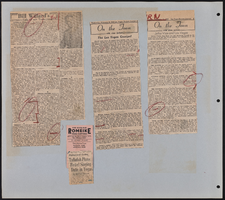Search the Special Collections and Archives Portal
Search Results
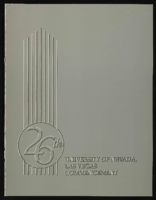
University of Nevada, Las Vegas (UNLV) 26th commencement program
Date
Archival Collection
Description
Commencement program from University of Nevada, Las Vegas Commencement Programs and Graduation Lists (UA-00115).
Text
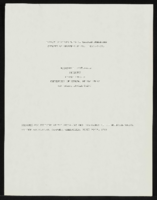
"Impact of Stereotypes of Mexican Americans Created by Selected Films: 1920s-1960s" paper by Roosevelt Fitzgerald
Date
Archival Collection
Description
From the Roosevelt Fitzgerald Professional Papers (MS-01082) -- Unpublished manuscripts file. Presented at the Social Science Conference of the National Social Science Association, Newport Beach, California.
Text
Harmon Family Papers
Identifier
Abstract
The Harmon Family Papers consist of the political and personal correspondence of Las Vegas, Nevada pioneer Harley A. Harmon from 1910 to 1934, and his son, Harley E. Harmon, from 1950 to 1966. The collection also includes correspondence, personal papers, and photographs of Harley L. Harmon from approximately 1950 to 1999. Also included are family scrapbooks with wedding announcements, photographs, birthday cards, newspaper clippings, and other ephemera.
Archival Collection
Elton and Madelaine Garrett Photograph and Architectural Drawing Collection
Identifier
Abstract
The Elton and Madelaine Garrett Photograph and Architectural Drawing Collection contains photographic prints and architectural drawings of Boulder (Hoover) Dam; Las Vegas, Nevada; Boulder City, Nevada; and other locations in the American Southwest from approximately 1927 to 1990. The photographs primarily depict Hoover Dam's construction and areas around Hoover Dam, Las Vegas, and Boulder City during the 1930s and 1940s. The bulk of the architectural drawings and maps are projects and diagrams related to the planning and development of Boulder City, Nevada between 1943 and 1985.
Archival Collection
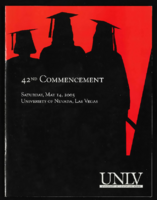
University of Nevada, Las Vegas (UNLV) 42nd commencement program
Date
Archival Collection
Description
Commencement program from University of Nevada, Las Vegas Commencement Programs and Graduation Lists (UA-00115).
Text

Myron Martin and Don Snyder interviews, November 30, 2017, December 06, 2017, and March 08, 2018: transcript
Date
Archival Collection
Description
Part 1: Interviewed by Stefani Evans. Myron G. Martin, President and CEO, and Donald D. Snyder, Chairman of the Board of Directors, share their memories of the founding of The Smith Center for the Performing Arts from the first non-for-profit foundation formed in 1996. The second iteration led by Snyder in 1999 brought in Martin--former Director of UNLV Performing Arts Center--and created a sustainable business plan for a center for the performing arts that would be accessible geographically and culturally for all segments of Nevada society. Here, Martin and Snyder recall how land, funding, and legislation for The Smith Center depended on the ""power of the project"" and the Snyder-Martin team's ability to overcome skeptics in the public, the Nevada Legislature, the Clark County Commission, the Las Vegas City Council, and the Don Reynolds Foundation. Martin and Snyder satisfied the various requirements for each organization and earned unanimous approval at each stop--in fact, the $50 million donation to The Smith Center was the largest the Don Reynolds Foundation had ever granted largest. That the approvals came on three consecutive days from competing municipal jurisdictions makes the accomplishment even sweeter. Subjects: Las Vegas, NV; Cultural center; Performing arts; The Smith Center for the Performing Arts; The Smith Center; Not-for-profit;; Nevada Legislature; Clark County Commission; Las Vegas City Council; The Don Reynolds Foundation; Fundraising; Planning; Endowment; Part 2: Interviewed by Stefani Evans. Martin, who was the youngest of three boys raised in suburban Houston, Texas, likes to say that in college at the University of North Texas he played for the Atlanta Braves and the Texas Rangers. So he did--as the organist. He earned a Bachelors of Music in piano, organ, and voice and an MBA from Golden Gate University. He came to Las Vegas after a fifteen-year career with the Baldwin Piano Company as executive director of the Liberace Foundation; he later became president of UNLV?s Performing Arts Center and in 1999 he became president of the Las Vegas Performing Arts Center Foundation. Here, Martin and Snyder recall the process whereby they hired architect David Schwarz of Washington, DC, to create The Smith Center's ""timeless, elegant"" look; creating a ""shared vocabulary"" by visiting 14 performing venues in 5 European countries; the City of Las Vegas's RFP that resulted in hiring Whiting-Turner Contracting Company; the exterior art/artists, significance of the bell tower, Founding Fifty(seven), and the ability of the theater to adapt from staging The Book of Mormon to staging a community funeral for two slain police officers. Subjects: The Smith Center; The Smith Center for the Performing Arts; Architecture; Fundraising; Acoustics; Public private partnerships; Request for proposals; Whiting-Turner; Theater Projects Group; vocabulary; Part 3: Interviewed by Stefani Evans. Author Jack Sheehan, joining this third session on The Smith Center in his role as Don Snyder's biographer, explains the way he envisions the place of The Smith Center in the larger context of Las Vegas. Martin and Snyder provide names for the group that grew out of the Call to Action meeting and founded the original Las Vegas Performing Arts Foundation. They share anecdotes of a 2005 trip, wherein they were joined by Las Vegas City Councilman Lawrence Weekly, City of Las Vegas Mayor Oscar Goodman, and consultant to the City of Las Vegas Dan Van Epp to visit City Place and the Kravis Center for Performing Arts in West Palm Beach as an example of a place where a performing arts center was a catalyst for revitalization in an area of underused and underutilized urban land. They discuss opening night, March 10, 2012, /From Dust To Dreams: Opening Night at the Smith Center For The Performing Arts/, which was produced broadcast live on national Public Broadcasting System (PBS) television stations, produced by George Stevens Jr. and directed and produced by Michael Stevens for The Stevens Company; hosted by Neil Patrick Harris; and featuring Jennifer Hudson, Willie Nelson, Merle Haggard, Emmylou Harris, Martina McBride, Carole King, Arturo Sandoval, Joshua Bell, Mavis Staples, Pat Monahan; American Ballet Theater dancers Marcello Gomes and Luciana Paris; also Broadway performers Brian Stokes Mitchell, Laura Osnes, Cheyenne Jackson, Sherie Rene Scott, Montego Glover, and Benjamin Walker. Martin describes how provisions of Nevada SB235--introduced March 6, 2017, signed into law by Governor Bob Sandoval, and became effective October 1, 2017--for the regulation of ticket sales to an athletic contest or live entertainment event affect The Smith Center ticket sales. They talk of providing 3,600 good construction jobs during the recession, of Discovery Childrens Museum, of future development plans for the entire 61-acre Symphony Park parcel, and of a second capital campaign to increase the endowment to $100 million to enable The Smith Center to be economically sustainable.
Text
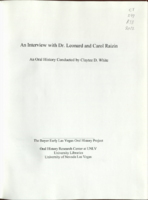
Transcript of interview with Dr. Leonard and Carol Raizen by Claytee D. White, April 8, 2009
Date
Archival Collection
Description
Leonard Raizin was born in Windsor, Ontario, Canada in 1930. His father was a cattle dealer. At an early age Raizin knew he wanted to be a doctor and after attending medical school he married his wife Carol Raizin born in Toronto, Canada. Leonard Raizin attended the University of Toronto for medical school in 1948. He met his wife Carol on a blind date. He started his internship at Sinai Hospital of Detroit in 1954. After a trip to Arizona and a feel of the desert weather the Raizins' with their four young daughters moved to Las Vegas, NV in 1961. When arriving in Las Vegas Dr. Raizin practiced at Southern Nevada Memorial Hospital (currently University Medical Center) and also at Sunrise as an anesthesiologist. There was a time while practicing in Las Vegas Dr. Raizin was the only anesthesiologist in the area, and experienced for the first 6 months of life in Las Vegas an extremely immersed schedule that never allowed him an entire night at home. Carol Raizin graduated as one of the first students at UNLV with a degree in Psychology in 1973. Carol eventually worked alongside her husband in their office handling bookkeeping for eight anesthesiologists. Dr. Leonard Raizin and Carol Raizin after a very successful life in Las Vegas are now retired. They still have a home in the Las Vegas area, however they spend their winters skiing in Park City, Utah and their summers fishing in Idaho.
Text
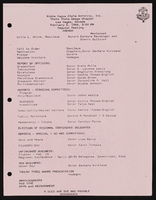
Alpha Kappa Alpha Sorority, Theta Theta Omega Chapter meeting agendas
Date
Archival Collection
Description
From the Alpha Kappa Alpha Sorority, Incorporated, Theta Theta Omega Chapter Records (MS-01014) -- Chapter records file.
Text
Peg and George E. Crockett Family Photographs
Identifier
Abstract
The Peg and George E. Crockett Family Photographs (approximately 1940-2008) are comprised of aerial photographs of Alamo Airport (later McCarran International Airport) and the surrounding Las Vegas Valley in the 1940s and 1950s. Photographs of the interior, exterior, and airfield at Alamo Airport document the early stages of what is now one of the busiest international airports in the United States. The collection also contains audiovisual material, which depict events including the Miss Rodeo America pageant and the Sahara Cup boat races on Lake Mead, and locations including Fremont Street in downtown Las Vegas, Nevada and Hoover Dam. A significant portion of the collection consists of photographs of the Crockett family at various events, on family vacations, and their home in Las Vegas, Nevada.
Archival Collection

